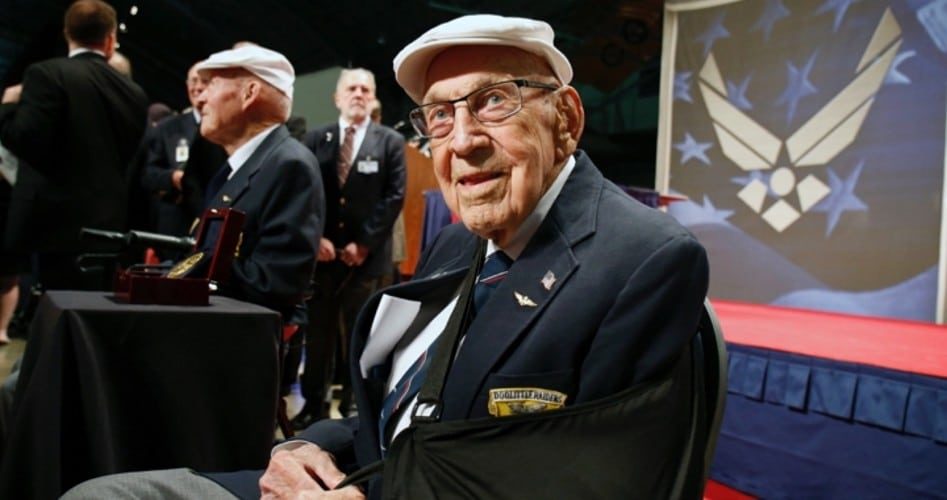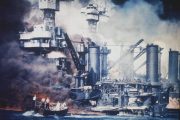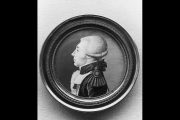
Another milestone has been reached of the history of the Second World War, with the passing of retired U.S. Air Force Lt. Colonel Richard “Dick” Cole. Cole died Tuesday in San Antonio, Texas, at age 103 — he was the last surviving member of the strike force of 16 bomber planes and 80 crew members that staged the famous April 18, 1942 bombing raid on Tokyo, Japan.
Cole was the co-pilot for Lt. Colonel James Doolittle during the raid. Doolittle, of the United States Army Air Force, was the planner and mission commander of the raid, which was launched in retaliation for the Japanese attack upon Pearl Harbor. Cole’s son and daughter were by his side at his death, according to the president of the Doolittle Tokyo Raiders Association in an interview with Air Force Times.
Cole was a native of Dayton, Ohio. He was honored in 2015, along with the other raiders, with the Congressional Gold Medal for “outstanding heroism, valor, skill and service to the United States.”
Following the raid on Tokyo, Cole and Doolittle made it into China (which had been at war with Japan for several years), where Cole parachuted to safety near Quzhou. Doolittle landed in a pile of dung, which was fortunate because he had a bad ankle that probably would have been broken otherwise.
The Doolittle Raid was considered by some as a potential suicide mission, but in September, Cole said, “I think the main thing was that you had to go in with a positive attitude. I really didn’t worry about it. It was our job, and we knew what to expect.”
Cole wrote a book about his service, entitled Dick Cole’s War: Doolittle Raider, Hump Pilot, Air Commando, published in 2015 by American Military Experience. Proceeds from the book go to a scholarship fund in Doolittle’s name for students in the aviation field.
Sixteen B-25 Mitchell medium bombers were launched from aboard the U.S.S. Hornet in the western Pacific Ocean. The bomber’s range was only 1,300 miles, requiring a modification so the planes could hold almost twice their normal fuel capacity. Even at that, the pilots and the crew knew that they would not be able to return to the Hornet or any other American ship, and would need to continue west after the bombing raid into friendly China. However, since the Japanese controlled most of the eastern provinces of China, it was known that they might not be able to make it beyond Japanese-controlled areas.
The bombing raid was first conceived by President Franklin Roosevelt on December 21, 1941, during a meeting with the chiefs of staff of the armed forces. Many Americans were upset not only at the Japanese attack on Pearl Harbor, but how the United States could have been caught so flat-footed, so they naturally wanted a strong American response. A bombing raid on Tokyo would demonstrate to the Japanese that their homeland was vulnerable to American air strikes.
While the bombing began about noon in Tokyo, against 10 military and industrial targets, other cities were hit as well: Yokohama, Yokosuka, Nagoya, Kobe, and Osaka, and a few civilians were killed in the raid. The raid greatly damaged Japanese morale, but the killing of civilians was used by the Japanese government for propaganda purposes to stir up the population. According to John Toland, in his book The Rising Sun, Japan’s military and civilian leader Hideki Tojo was speaking to the people of Tokyo on public address speakers at the moment the bombs began falling, boasting no Americans would ever get to within 500 miles of Japan.
After the raid, Americans were forced to fly to China rather than to Vladivostok in Russia, about 600 miles closer, because Soviet dictator Joseph Stalin refused to allow it. Stalin, based on information from his German Communist spy in Japan, Richard Sorge, knew before Pearl Harbor that the Japanese would attack America rather than the Soviet Union. Because of this, he had been able to shift his military forces away from the Far East to aid in the defense of Moscow, and did not want any retaliation from Japan.
Chiang Kai-shek, who made every effort to be a good ally to the United States, allowed American pilots to land in China, though he feared possible retaliation on his civilian population by the Japanese. The retaliation proved even more horrific than expected, as an estimated quarter of a million Chinese civilians were killed by Japanese military forces.
John Birch, an American Baptist missionary in China, was instrumental in saving many of the pilots, including Doolittle, Cole, and the rest of his crew, from the Japanese. Fortunately for Doolittle, Birch — who is the namesake for the anti-communist John Birch Society founded by Robert Welch in 1958 — was involved in missionary work near the Lan River, and found Doolittle and several others hiding in a boat. Birch saved them from the advancing Japanese troops.
Unfortunately, Birch was murdered at the end of the war by Mao Tse-Tung’s communists.
Dick Cole lived 77 more years after the raid, and 74 years after the end of the war. The acting Secretary of Defense, Pat Shanahan, said of Cole, “Our Nation has lost a legend. Our thoughts are with the family of Lt. Col. Dick Cole, the last of the Doolittle Raiders, who passed away at age 103. He was a true trailblazer, and his selfless legacy of service lives on in our Airmen of today and tomorrow.”
A memorial service will be held April 18 at Randolph Air Force Base in San Antonio, and Cole will be buried at Arlington National Cemetery.
Photo: AP Images



